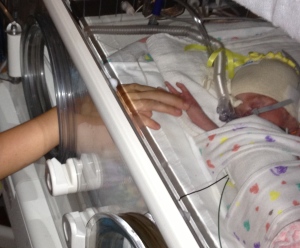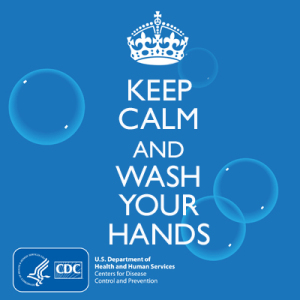I saw the excitement in my daughters’ eyes as we entered the NICU for them to meet their sister, Lydia, for the first time. We filled out the sibling visitation form and proceeded to the hand washing station and meticulously scrubbed their 7 and 5 year old hands and fingers.
Our newest daughter, born at 27 weeks weighing 2 lbs 7 oz, was enclosed in her isolette, which served as both a painful barrier to us being together and a protective cocoon, encapsulating her from what now seemed like a world full of germs, any of which could threaten her very survival.
I will admit that with my first two children, I was not the mom who was forever fretting about germs and getting sick. Quite the opposite. Never having owned even a shopping cart cover, you might have seen my older girls licking the cart handles. Well, maybe not. But you get the point. Then I had a preemie.
In the dim light of my daughter’s hospital room, her big sisters peered into the isolette, eyes full of wonder and amazement, far from the fear I had anticipated. Then they asked the question I had been dreading, “Can we touch her?” I knew it was coming. My mind had to balance the desire for them to begin to love and care for their little sister with the knowledge of just where those little hands had been! Preschool and 1st grade, the playground, the restroom, the cafeteria, the library, dance class…and my head began to spin.
Then I remembered that we had thoroughly washed and scrubbed the girls down just minutes before. We were also fastidious about using the hand sanitizer attached to the hospital wall at the entrance of the room. I opened the isolette door, and I watched a relationship of love and acceptance blossom that many people never get to witness. It was fascinating how my older daughters didn’t seem to notice the ventilator, feeding tube, PICC line, monitor, or anything else for that matter. They only saw their sister, whom they loved and adored just the way she was from that moment until this very day. It was unconditional and forever. I’m glad my fear of germs did not stop me from opening the holes of the isolette and letting sisters create a tangible bond through touch.
My girls soon became pros at handwashing over the course of our 79 day NICU stay and especially after discharge. We came home in October, the beginning of RSV season here, and one of the biggest dangers to my preemie was her school age siblings. We followed a strict quarantine for six months, but the germs my older girls encountered during the day at school came straight to our front door in the afternoons. We soon developed a routine. Hand sanitizer upon entering the car and no touching the baby until we got home. They loved to sing to her during this time! Once home, upon entering the laundry room, all clothing and shoes for the day came off, and both girls went straight to the bathroom to wash hands and apply hand sanitizer. Singing a favorite song is a great way for kids to wash hands long enough! Finally, fresh clothing went on and sibling playtime could begin!
I am proud to say that my girls continued this daily hand washing routine from October until the end of the school year. They took it very seriously and were on a mission to protect their sister, even requesting mini hand sanitizers to keep in their backpacks. I credit excellent hand washing (and quarantine, of course) for us having a healthy RSV season, only visiting the pediatrician for a sick visit once for an ear infection. According to the CDC, good hand washing can reduce respiratory illnesses by 21%! That’s music to a preemie mom’s ears!
We just learned that our daughter does not qualify for Synagis this RSV season. Combine that with the enterovirus scare, and I enter this cold and flu season with trepidation. The good news is that hand washing, along with avoiding those who may be sick, can help stop the spread of these viruses that can be so harmful to already fragile babies and children.
Do not underestimate the value of hand washing in protecting your preemie. Do not let people tell you that your baby needs to be exposed to germs. Do not be afraid to ask people to wash hands before holding your child. You must be your child’s first line of defense, and one of the best weapons against illness is good hand washing. It’s easy, cheap, and everyone can do it!
For more information and a how to on proper hand washing: http://www.cdc.gov/HandWashing/pdf/wash-your-hands-poster.pdf



.JPG)
.JPG)
.JPG)
.JPG)
.JPG)
.JPG)
.JPG)
.JPG)



